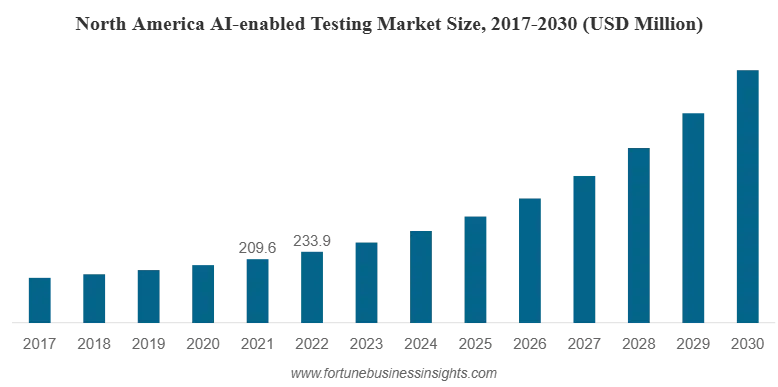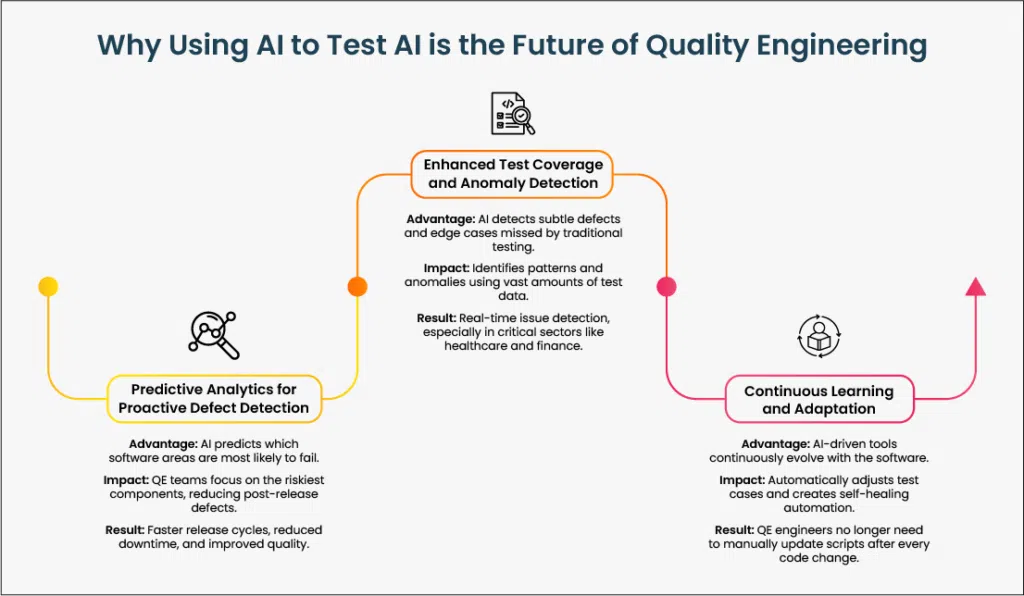AI-Driven Testing: All You Need to Know
In the evolving landscape of software development, innovation continues to drive the need for more efficient and reliable solutions. One of the most significant advancements in this area is AI-driven testing, which is transforming how applications are tested, validated, and optimized. This cutting-edge technology leverages artificial intelligence to automate various aspects of software testing, leading to enhanced speed, accuracy, and artificial intelligence cost efficiency. In this article, we will delve into what AI-driven testing entails, explore its benefits, and present compelling statistics that highlight its impact on the software industry. Additionally, we will discuss how partnering Savvycom can help businesses integrate AI into their testing workflows as latest trends in ai are rising.
To illustrate the growing influence of AI in testing, here are some key statistics:
- According to a study by Fortune Business Insights, the global AI-driven testing market is expected to reach $2,746.6 million by 2030, growing at a compound annual growth rate (CAGR) of 20.7% during the forecast period.

Image source: Fortune Business Insights
- A report by Gartner estimates that by 2024, 75% of organizations will be using AI-driven testing as part of their DevOps processes.
- AI-driven testing has been shown to reduce the time needed for test case execution by up to 40%, as noted in a report from Accenture.
These statistics underscore the growing adoption of AI-driven testing and its potential to revolutionize software development processes.
What is AI-Driven Testing?
AI-driven testing refers to the use of artificial intelligence techniques and algorithms to automate and enhance the software testing process. Unlike traditional testing methods, which rely on manual efforts or basic automation scripts, AI-based testing utilizes machine learning and data analysis to create smarter and more adaptive testing frameworks.
Machine learning algorithms are trained to recognize patterns in the software and predict potential bugs or vulnerabilities. As AI systems learn from historical data and ongoing test results, they continuously refine their testing strategies, ensuring higher accuracy and greater coverage. This approach allows AI-powered testing to identify issues that traditional methods might overlook.
The Importance of AI in Software Testing
Software applications are becoming increasingly complex, with multiple interconnected systems and user interactions. In such an environment, traditional testing methods struggle to keep up with the growing volume and intricacy of test cases. This is where AI testing comes in, offering several key advantages:
-
Increased Speed and Efficiency: AI testing can automate repetitive tasks, such as regression testing, allowing software developers to focus on more strategic aspects of the project. According to a survey conducted by Capgemini, 67% of respondents believed that AI would make software testing faster and more efficient.
-
Improved Test Accuracy: AI-powered tools can quickly analyze vast amounts of data and detect subtle anomalies that human testers might miss. The use of AI testing has been found to reduce test failures by up to 30%, according to a report from Testim.
-
Scalability: As applications grow in size and complexity, AI-driven testing can easily scale to handle larger volumes of test cases. Unlike manual testing, which can become cumbersome with more complex projects, AI frameworks are highly adaptable.
-
Continuous Learning and Adaptation: One of the major benefits of AI in testing is its ability to learn from previous tests and adjust its methods accordingly. Machine learning algorithms can recognize recurring issues and focus on high-risk areas, resulting in more targeted testing efforts.

Image source: Fortune Business Insights
Key Features of AI-Driven Testing
AI-driven testing brings a range of advanced capabilities that set it apart from traditional testing methods. These key features not only enhance efficiency but also ensure more precise and adaptable testing processes, making AI an indispensable tool in modern software development.
1. Self-Learning Systems
AI-driven software testing tools employ machine learning models that continuously evolve based on feedback from past tests. These self-learning systems are capable of analyzing the effectiveness of previous tests, identifying patterns, and making predictions about potential software vulnerabilities. This predictive capability allows testers to proactively address issues before they arise.
2. Automated Test Case Generation
AI tools can automatically generate new test cases by analyzing the underlying code and behavior of the application. This significantly reduces the time required to create test cases manually, while also ensuring that the tests cover all possible user scenarios.
3. Smart Test Maintenance
Traditional automated testing frameworks require frequent updates and maintenance as software evolves. However, with AI-driven testing, these updates are handled automatically. AI tools can detect changes in the software and modify test scripts accordingly, ensuring that the tests remain relevant and effective.
4. Risk-Based Testing
AI tools can prioritize test cases based on the likelihood of failure or risk. By identifying areas of the software that are more prone to defects, testers can allocate resources more efficiently, focusing on the most critical aspects of the application.
Have a Project Idea in Mind?
Get in touch with Savvycom’s experts for a free consultation. We’ll help you decide on next steps, explain how the software development process is organized, and provide you with a free project estimate.
AI in Action: Real-World Examples
Many organizations are already leveraging AI testing to improve their software development processes. One notable example is Google, which has implemented AI-powered tools to enhance its testing procedures. According to a report, Google’s AI-driven testing solution has reduced bug detection time by 15% and improved overall code quality.
Similarly, Netflix has embraced AI-powered testing to optimize its video streaming platform. By using machine learning algorithms, Netflix can predict potential playback issues and address them before they affect user experience. This proactive approach has helped Netflix reduce downtime by 20%.
The Role of a Software Development Company in AI-Driven Testing
Implementing AI-powered testing requires specialized knowledge and expertise. While some organizations may choose to develop their AI-driven testing solutions in-house, many businesses find it more efficient to collaborate with a software testing outsourcing companies. These companies possess the technical skills and resources needed to integrate AI tools into existing workflows.
A reputable software development company can offer several advantages, including:
- Expert Consultation: Experienced developers can provide guidance on selecting the right AI-driven testing tools and frameworks that align with a business’s unique requirements.
- Customization: A software development company can tailor AI solutions to meet the specific needs of the business, ensuring that the testing process is optimized for efficiency and accuracy.
- Ongoing Support: As AI-driven testing tools evolve, a software development company can provide ongoing support and maintenance to ensure that the system remains up-to-date and effective.
Challenges in Implementing AI-Driven Testing
While AI-powered testing offers numerous benefits, there are also challenges to consider. Implementing AI solutions requires an initial investment in both technology and training. Additionally, organizations must ensure that their AI models are trained on accurate and diverse datasets to avoid biased results.
Another challenge is the need for collaboration between AI tools and human testers. While AI can handle a significant portion of the workload, human oversight is still necessary to interpret results and address complex issues.

Future of AI-Driven Testing
As AI technology continues to evolve, so will the capabilities of AI-driven testing tools. In the future, we can expect to see even more advanced algorithms that can autonomously test applications and make real-time adjustments to code. AI-powered testing will likely play a central role in the development of autonomous systems, smart applications, and AI-powered solutions.
Furthermore, as AI testing becomes more integrated with DevOps practices, organizations will be able to release software updates faster and with greater confidence in their quality.
Conclusion
AI-powered testing is rapidly transforming the software development landscape by automating and optimizing the testing process. With its ability to increase efficiency, accuracy, and scalability, AI-driven testing is poised to become a cornerstone of modern software development. As more organizations adopt this technology, the need for skilled implementation and customization will grow, making partnerships with software development companies essential for success.
At Savvycom, we are committed to helping businesses harness the power of AI-driven testing to improve their software development processes. As a leading software development company, we offer customized AI solutions that are tailored to meet the unique needs of each client. Our team of experts will work closely with you to implement cutting-edge AI technologies that enhance the quality and efficiency of your software applications. Contact us today to learn more about how we can support your AI-driven testing initiatives.
Tech Consulting, End-to-End Product Development, Cloud & DevOps Service! Since 2009, Savvycom has been harnessing digital technologies for the benefit of businesses, mid and large enterprises, and startups across the variety of industries. We can help you to build high-quality software solutions and production system in AI as well as deliver a wide range of related professional services.
Savvycom is right where you need. Contact us now for further consultation:
- Phone: +84 24 3202 9222
- Hotline: +1 408 663 8600 (US); +612 8006 1349 (AUS); +84 32 675 2886 (VN)
- Email: [email protected]


